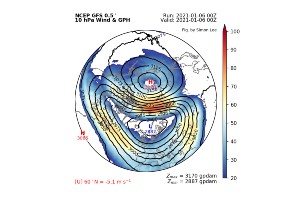SSW raises risk of cold UK weather this winter
06 January 2021

A major sudden stratospheric warming (SSW) detected high above the Arctic could bring unusually cold and snowy conditions to the UK in the coming weeks.
An SSW – where temperatures in the layer of the atmosphere called the stratosphere, around 10-50km above the Earth’s surface, warms by up to 50°C in a matter of days – can affect the lower atmosphere where our weather occurs, altering the jet stream and increasing the likelihood of unusually cold weather, as was seen in the ‘Beast from the East’ in February and March 2018.
Scientists at the University of Reading say that, although the SSW does not guarantee another ‘Beast’ is on the way, the current atmospheric conditions make it more likely that Europe could be hit by unusually cold weather at any time in the next six weeks.
Recent research published at Reading showed that it is possible to estimate an increase in deaths in the UK following SSWs. The study found that there were on average 620 additional deaths in the UK linked to cold weather following SSWs, meaning health services already stretched by the rise in Covid-19 infections may face additional pressures in the coming weeks if a cold snap does occur.
Simon Lee, an atmospheric science and weather forecasting researcher at the University of Reading, said: "A weakening of the jet stream often occurs after an SSW, meaning the UK is now more prone to outbreaks of colder weather from the north and east than it was before.
"A weakened polar vortex can last for up to two months, so there is an increased likelihood of colder, drier weather occurring in Europe sometime in the next 4-6 weeks due to weaker Atlantic westerly winds. This also means we are less likely to see the kind of windstorms and heavy rainfall associated with a strong jet stream that we experienced last winter.
“Major sudden stratospheric warming (SSW) events occur on average slightly more often than once every other winter. When the polar vortex is strong, the jet stream is often strong – bringing a milder winter to the UK and often an increase in Atlantic windstorms. Last winter, the polar vortex was unusually strong, and we saw a very wet and mild winter with several major storms – such as Ciara and Dennis.
“The most extreme example of a cold snap following an SSW was the so-called 'Beast from the East' in 2018. However, awakening a new Beast this winter is far from a certainty, as this SSW is only one atmospheric factor which can influence the weather in the UK. For example, the most recent major SSW on 2 January 2019 was not followed by a prolonged spell of cold weather.
“Although an increased risk of extremely cold weather poses a threat to health and infrastructure, SSWs are helpful in other ways. Our knowledge of their knock-on impact on weather allows forecasters to make more confident predictions for weather several weeks in advance, well beyond the time periods typically associated with day-to-day forecasts, and therefore allows advance planning to be put in place to deal with the effects.”
SSWs are just one factor that influence UK weather. The Met Office says the La Nina conditions seen in the Pacific, which tends to bring milder weather to the UK in the second half of winter, is one factor that could counteract the likelihood of extreme cold weather in Europe this winter.
Image caption: Image based on SSW analysis from the Global Forecasting system model. Credit Simon Lee/University of Reading

